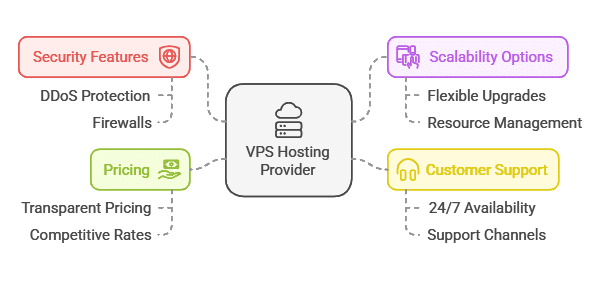In today’s fast-paced digital world, websites are essential for businesses, individuals, and organizations. But as we rely more on online platforms, the risk of cyberattacks, especially Distributed Denial of Service (DDoS) attacks, has skyrocketed.
One effective way to safeguard your website is through Virtual Private Server (VPS) hosting. VPS hosting not only enhances performance but also offers robust security measures to defend against DDoS attacks. This article will explore five powerful ways VPS Hosting for DDoS Protection your website from such threats, helping you keep your online presence secure and operational.
What is a DDoS Attack?

A Distributed Denial of Service (DDoS) attack occurs when multiple systems flood the resources of a targeted server, overwhelming it with excessive traffic. This traffic can come from hundreds or even thousands of compromised devices, known as a botnet. The result? Your website slows down or crashes entirely, rendering it inaccessible to legitimate users.
Impact of DDoS Attacks:
| Aspect | Effect |
| Website Downtime | Loss of visitors and revenue |
| Reputation Damage | Reduced customer trust |
| Security Vulnerabilities | Increased exposure to other attacks |
| Operational Disruptions | Loss of productivity |
According to a 2023 report, the average DDoS attack can last hours and cost businesses thousands of dollars in lost revenue. The severity makes it essential to implement strong defenses against such attacks.
What is VPS Hosting?
Virtual Private Server (VPS) hosting is a type of web hosting that provides a dedicated portion of server resources within a larger physical server. Unlike shared hosting, where resources are shared among many users, VPS hosting offers greater control, performance, and security.
Key Features of VPS Hosting:
| Feature | Benefit |
| Dedicated Resources | Consistent performance and reliability |
| Scalability | Ability to expand resources as needed |
| Root Access | Customization of server settings |
| Isolation from Other Users | Enhanced security and stability |
VPS hosting’s dedicated environment makes it particularly effective in protecting websites from DDoS attacks. Let’s explore how.
5 Ways VPS Hosting Protects Your Website From DDoS Attacks
1. Dedicated Resources for Enhanced Stability
With VPS hosting, your website has dedicated resources, including CPU, RAM, and storage. Unlike shared hosting, where a spike in traffic on one website can affect others, VPS ensures your website remains stable and operational during a DDoS attack.
How It Helps:
- Resource Isolation: Your website’s resources aren’t shared, so malicious traffic targeting another site on the same server won’t affect you.
- Consistent Performance: Even during traffic surges, your website’s performance remains unaffected.
| Shared Hosting | VPS Hosting |
| Shared resources | Dedicated resources |
| Vulnerable to neighbor spikes | Isolated and secure |
2. Scalability to Handle Traffic Surges
DDoS attacks often involve massive traffic spikes. VPS hosting allows you to scale resources quickly to handle these surges without disrupting your website’s functionality.
How It Helps:
- Flexible Scaling: Instantly add more CPU or RAM to counter the attack.
- Adaptability: Handles unexpected traffic without crashing.
| Scenario | Benefit of VPS Hosting |
| Sudden traffic spike due to DDoS | Seamless scaling prevents downtime |
| Seasonal or promotional traffic | On-demand scalability |
3. Advanced Firewall Configurations
Firewalls are the first line of defense against DDoS attacks. VPS hosting allows you to configure advanced firewall settings to filter malicious traffic effectively.
How It Helps:
- Custom Rules: Block suspicious IPs and traffic patterns.
- Traffic Filtering: Prevent harmful requests from reaching your server.
| Firewall Capability | Benefit |
| Custom rule configurations | Tailored defense against attacks |
| Blocking malicious IP addresses | Prevents repeated attack attempts |
4. Integrated DDoS Protection Features
Many VPS hosting providers include built-in DDoS protection as part of their plans. These features detect and mitigate attacks in real time.
How It Helps:
- Threat Detection: Monitors traffic to identify unusual patterns.
- Automated Mitigation: Blocks malicious traffic without manual intervention.
| Feature | Benefit |
| Real-time monitoring | Immediate detection of threats |
| Automatic traffic rerouting | Minimizes impact on server resources |
5. Improved IP Reputation Management
With VPS hosting, you get a unique IP address, reducing the risk of being associated with malicious activities on shared servers.
How It Helps:
- Unique IP Address: Prevents blacklisting caused by other users.
- Better Reputation: Ensures reliable email delivery and traffic routing.
| Shared Hosting | VPS Hosting |
| Shared IP address | Unique IP address |
| Prone to blacklisting | Clean and trusted IP reputation |
How to Choose the Right VPS Hosting Provider?
To maximize the benefits of VPS hosting, selecting the right provider is crucial. Here are some factors to consider:
| Criteria | What to Look For |
| Security Features | DDoS protection, firewalls |
| Scalability Options | Flexible resource upgrades |
| Customer Support | 24/7 availability |
| Pricing | Transparent and competitive |
Popular providers like AWS, DigitalOcean, and Bluehost offer reliable VPS hosting plans tailored to different needs.
Takeaways
In a world where DDoS attacks are increasingly common, safeguarding your website is non-negotiable. VPS hosting provides robust defenses through dedicated resources, scalability, advanced firewalls, integrated DDoS protection, and improved IP reputation. By investing in VPS hosting, you can ensure your website remains secure, operational, and trustworthy.
Don’t wait for an attack to strike. Upgrade to VPS hosting today and take proactive steps to protect your online presence.





































